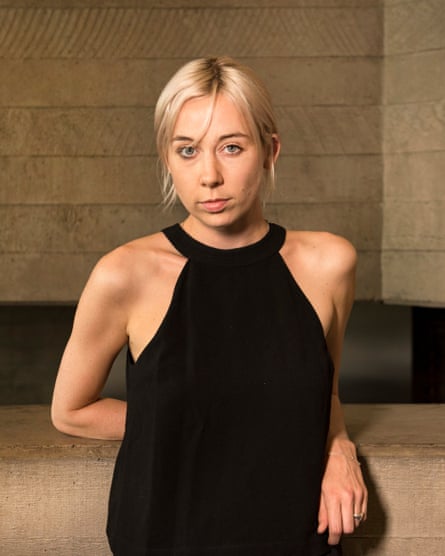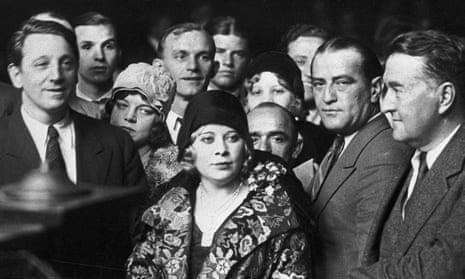When Mae West’s play The Drag was first performed, in Connecticut in 1927, its author was starring as a prostitute in the scandalous Broadway hit Sex. That show was soon deemed indecent, earning her a 10-day jail sentence. She took a limo to prison and said she wore silk underwear throughout her detention. The Drag proved no less controversial: it lasted for 10 performances before it was banned.
Why the fuss? Partly because West was a woman writing about sexuality and, in particular, gay male sexuality. The Drag, subtitled A Homosexual Comedy in Three Acts and written under the pseudonym Jane Mast, is about the cost of living with a secret life. Its hero is a closeted gay socialite, Rolly Kingsbury, who comes “from one of the finest families” and is trapped in a loveless marriage. Rolly’s father is a homophobic judge, his father-in-law a therapist who specialises in gay conversion. West herself had been a male impersonator early in her career, and the play culminates in an elaborate drag ball, with largely improvised dialogue and a jazz band on stage.

The Drag was inspired by her many gay friends. She knew their daily struggles to be open about their relationships, and to be accepted for who they were. When casting the play, she actively sought out gay actors. As a playwright she is compassionate, but also very funny. From performing in stage revues and burlesques, West had gained a reputation as a sex symbol and, as someone who was subjected to it herself, she had a particular understanding of the male gaze. This gave her an interesting angle when writing from a homosexual man’s point of view.
West’s casting of gay men was incendiary at a time when the actors’ union barred them from parts with lines. Likewise the manner in which she auditioned them: open casting calls at a gay bar in Greenwich Village. In her autobiography, she claimed to have “helped a lot of gay boys along” by casting them at a time when “producers never gave speaking parts to homosexuals”.
When it opened in Connecticut, The Drag was a success with audiences, although Variety called it “an inexpressibly brutal and vulgar attempt to capitalise on a dirty matter for profit”. West had hoped it would run on Broadway but it never made it. One Broadway producer said it was “the worst possible play I have ever heard of contemplating an invasion of New York” and that it “strikes at the heart of decency”.
West’s take was that audiences were “too childlike to face like grownups the problem of homosexuals”. The Drag was just too risque for the mainstream. West rewrote the play a year later as The Pleasure Man, sanitising it by making the lead character straight, but she still faced criticism for it being too explicit. Like Sex, The Pleasure Man eventually landed her in court.

The Drag deals with guilt, shame and families falling apart over secrets. As the director of a new revival at the National Theatre, I have been fascinated by its strong elements of farce – that’s quite a traditional form to explore such subversive content. It has an anarchic streak, too, which I’ve always liked and I hope there’s always one in my own plays, which have also been concerned with family dynamics.
The play feels very nonjudgmental: it just poses the situation. I’m constantly trying to remind myself how radical it was. West had a lot of status, she was a public woman, so I think it was very brave of her to put it on. Women today are still outnumbered in the arts. Back then, 90 years ago, she was a playwright in an extremely male-dominated profession. That’s radical in itself – but if you consider the kind of plays she wrote, she can be seen as an activist too. Outsiders always appeal to me and that’s what West was.
While The Drag is very much of its time, the play is certainly still relevant. I think it’s easy to forget, living in a liberal city like London and working in the arts, as I do, that it’s still tough for gay people around the world. Just look at the reports about Chechnya’s detention centres for gay men.
The Drag is about a very specific subsection of the LGBT community, with its focus on upper-middle-class, white, cisgendered men. In her autobiography, West talks about what compelled her to write it and her other plays that “brought down the howl of the too pious”. She describes feeling “a strong compulsion to put down a realistic drama of the tragic waste of a way of life that was spreading into modern society, at a time when any mention of it was met by ordinary people with a state of shocked horror”.
Things have undeniably moved on but, despite all this progress, we still haven’t fully attained equality in the UK. I find it patronising that gay marriage has only been a thing for a few years. It’s a human right to be able to get married. It’s so important to keep the Pride celebration going, keep it visible. I’m looking forward to the day when there will be married gay grandparents.
- Polly Stenham directs a rehearsed reading of The Drag on 10 July as part of Queer Theatre, 6-10 July, a season at the National Theatre, London, to mark the 50th anniversary of the partial decriminalisation of homosexuality in England and Wales.
